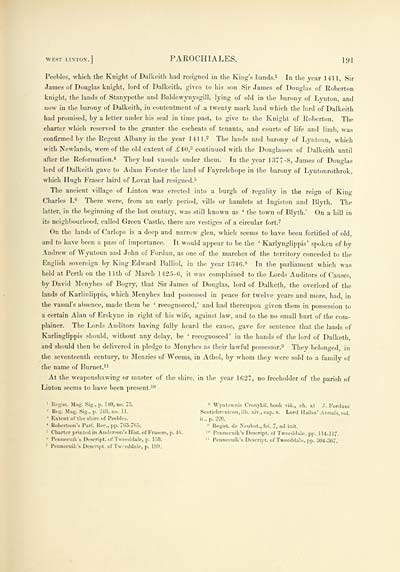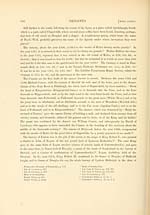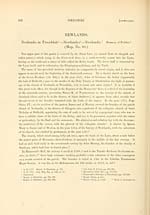Bannatyne Club > Origines parochiales Scotiae > Volume 1
(241) Page 191
Download files
Complete book:
Individual page:
Thumbnail gallery: Grid view | List view

WEST LINTON-.] PAROCHIALES. 191
Peebles, which the Knight of Dalkeith had resigned in the King's hands.i In the year 1411, Sir
James of Douglas knight, lord of Dalkeith, gives to his son Sir James of Douglas of Roberton
knight, the lands of Stanypethe and Baldewynysgill, lying of old in the harony of Lynton, and
now in the bai'ony of Dalkeith, in contentment of a twenty mark land which the lord of Dalkeith
had promised, by a letter under his seal in time past, to give to the Knight of Roberton. The
charter which reserved to the granter the escheats of tenants, and courts of life and limb, was
confirmed by the Regent Albany in the year 1411.2 Jijg lands and barony of Lyntoun, which
with Newlands, were of the old extent of £40,^ continued with the Douglasses of Dalkeith until
after the Reformation.'' They had vassals under them. In the year 1 377-8, James of Douglas
lord of Dalkeith gave to Adam Forster the land of Fayrelehope in the barony of Lyntonrothrok,
which Hugh Fraser laird of Lovat had resigned.^
The ancient village of Linton was erected into a burgh of regality in the reifn of Kiu"
Charles I.^ There were, from an early period, vills or hamlets at Ingiston and Blyth. The
latter, in the beginning of the last century, was still known as ' the town of Blyth." On a hill in
its neighbourhood, called Green Castle, there are vestiges of a circular fort.''
On the lands of Carlops is a deep and narrow glen, which seems to have been fortified of old,
and to have been a pass of importance. It would appear to be the ' Karlynglippis' spoken of by
Andrew of Wyntoun and John of Fordun, as one of the marches of the territory conceded to the
English sovereign by King Edward Balliol, in the year 1346.* In the parliament which was
held at Perth on the 11th of March 1423-6, it was complained to the Lords Auditors of Causes,
by David i\Ienyhes of Bogry, that Sir James of Douglas, lord of Dalketh, the overlord of the
lands of Karlinlippis, which Menyhes had possessed in peace for twelve years and more, had, in
the vassal's absence, made them be ' recognosced,' and had thereupon given them in possession to
a certain Alan of Erskyne in right of his wife, against law, and to the no small hurt of the coni-
plainer. The Lords Auditors having fully heard the cause, gave for sentence that the lands of
Karlinglippis should, without any delay, be ' recognosced' in the hands of the lord of Dalketh,
and should then be delivered in pledge to Menyhes as their lawful possessor.^ They belontred, in
the seventeenth century, to IMenzies of Weems, in Athol, by whom they were sold to a family of
the name of Burnet.^'
At the weaponshawing or muster of the shire, in the year 1627, no freeholder of the parish of
Linton seems to have been present.'"
' Regist. Mag. Sig., ]i. 140, no. 7.3. » Wyntownis Cronykil, book viii., cli. .\1 J. Forduni
-' Reg. Mag. Sig., p. '248, no. 11. SeoticIironicon,lib. xiv., cap. v. Lord Hailes' Annals, vol.
■' Extent of the shire of Peehlcs. ij., p. 220.
■* Robertson's Pari. Rec, pp. 763-765. = Regist. de Neubot., fol. 7, ad init.
5 Charter printed in Anderson 's Hist, of Erasers, p. 4(). '" Pennecuik's Descript. of Tweeddale, pp. 114-117.
" Pennecuik's Descript. of Tweeddale, p. 158. " Pennecuik's Descript. of Tweeddale, pp. 304-307.
■ Pennecuik's Descript, of Twi eddale, p. 199.
Peebles, which the Knight of Dalkeith had resigned in the King's hands.i In the year 1411, Sir
James of Douglas knight, lord of Dalkeith, gives to his son Sir James of Douglas of Roberton
knight, the lands of Stanypethe and Baldewynysgill, lying of old in the harony of Lynton, and
now in the bai'ony of Dalkeith, in contentment of a twenty mark land which the lord of Dalkeith
had promised, by a letter under his seal in time past, to give to the Knight of Roberton. The
charter which reserved to the granter the escheats of tenants, and courts of life and limb, was
confirmed by the Regent Albany in the year 1411.2 Jijg lands and barony of Lyntoun, which
with Newlands, were of the old extent of £40,^ continued with the Douglasses of Dalkeith until
after the Reformation.'' They had vassals under them. In the year 1 377-8, James of Douglas
lord of Dalkeith gave to Adam Forster the land of Fayrelehope in the barony of Lyntonrothrok,
which Hugh Fraser laird of Lovat had resigned.^
The ancient village of Linton was erected into a burgh of regality in the reifn of Kiu"
Charles I.^ There were, from an early period, vills or hamlets at Ingiston and Blyth. The
latter, in the beginning of the last century, was still known as ' the town of Blyth." On a hill in
its neighbourhood, called Green Castle, there are vestiges of a circular fort.''
On the lands of Carlops is a deep and narrow glen, which seems to have been fortified of old,
and to have been a pass of importance. It would appear to be the ' Karlynglippis' spoken of by
Andrew of Wyntoun and John of Fordun, as one of the marches of the territory conceded to the
English sovereign by King Edward Balliol, in the year 1346.* In the parliament which was
held at Perth on the 11th of March 1423-6, it was complained to the Lords Auditors of Causes,
by David i\Ienyhes of Bogry, that Sir James of Douglas, lord of Dalketh, the overlord of the
lands of Karlinlippis, which Menyhes had possessed in peace for twelve years and more, had, in
the vassal's absence, made them be ' recognosced,' and had thereupon given them in possession to
a certain Alan of Erskyne in right of his wife, against law, and to the no small hurt of the coni-
plainer. The Lords Auditors having fully heard the cause, gave for sentence that the lands of
Karlinglippis should, without any delay, be ' recognosced' in the hands of the lord of Dalketh,
and should then be delivered in pledge to Menyhes as their lawful possessor.^ They belontred, in
the seventeenth century, to IMenzies of Weems, in Athol, by whom they were sold to a family of
the name of Burnet.^'
At the weaponshawing or muster of the shire, in the year 1627, no freeholder of the parish of
Linton seems to have been present.'"
' Regist. Mag. Sig., ]i. 140, no. 7.3. » Wyntownis Cronykil, book viii., cli. .\1 J. Forduni
-' Reg. Mag. Sig., p. '248, no. 11. SeoticIironicon,lib. xiv., cap. v. Lord Hailes' Annals, vol.
■' Extent of the shire of Peehlcs. ij., p. 220.
■* Robertson's Pari. Rec, pp. 763-765. = Regist. de Neubot., fol. 7, ad init.
5 Charter printed in Anderson 's Hist, of Erasers, p. 4(). '" Pennecuik's Descript. of Tweeddale, pp. 114-117.
" Pennecuik's Descript. of Tweeddale, p. 158. " Pennecuik's Descript. of Tweeddale, pp. 304-307.
■ Pennecuik's Descript, of Twi eddale, p. 199.
Set display mode to: Large image | Transcription
Images and transcriptions on this page, including medium image downloads, may be used under the Creative Commons Attribution 4.0 International Licence unless otherwise stated. ![]()
| Publications by Scottish clubs > Bannatyne Club > Origines parochiales Scotiae > Volume 1 > (241) Page 191 |
|---|
| Permanent URL | https://digital.nls.uk/81025876 |
|---|
| Description | Volume first. Diocese of Glasgow. |
|---|---|
| Shelfmark | SCS.BC.97 |
| Additional NLS resources: | |
| Attribution and copyright: |
|
| Description | Place of publication Edinburgh unless otherwise stated. No. 125 is relative to but not part of the club's series. |
|---|---|

